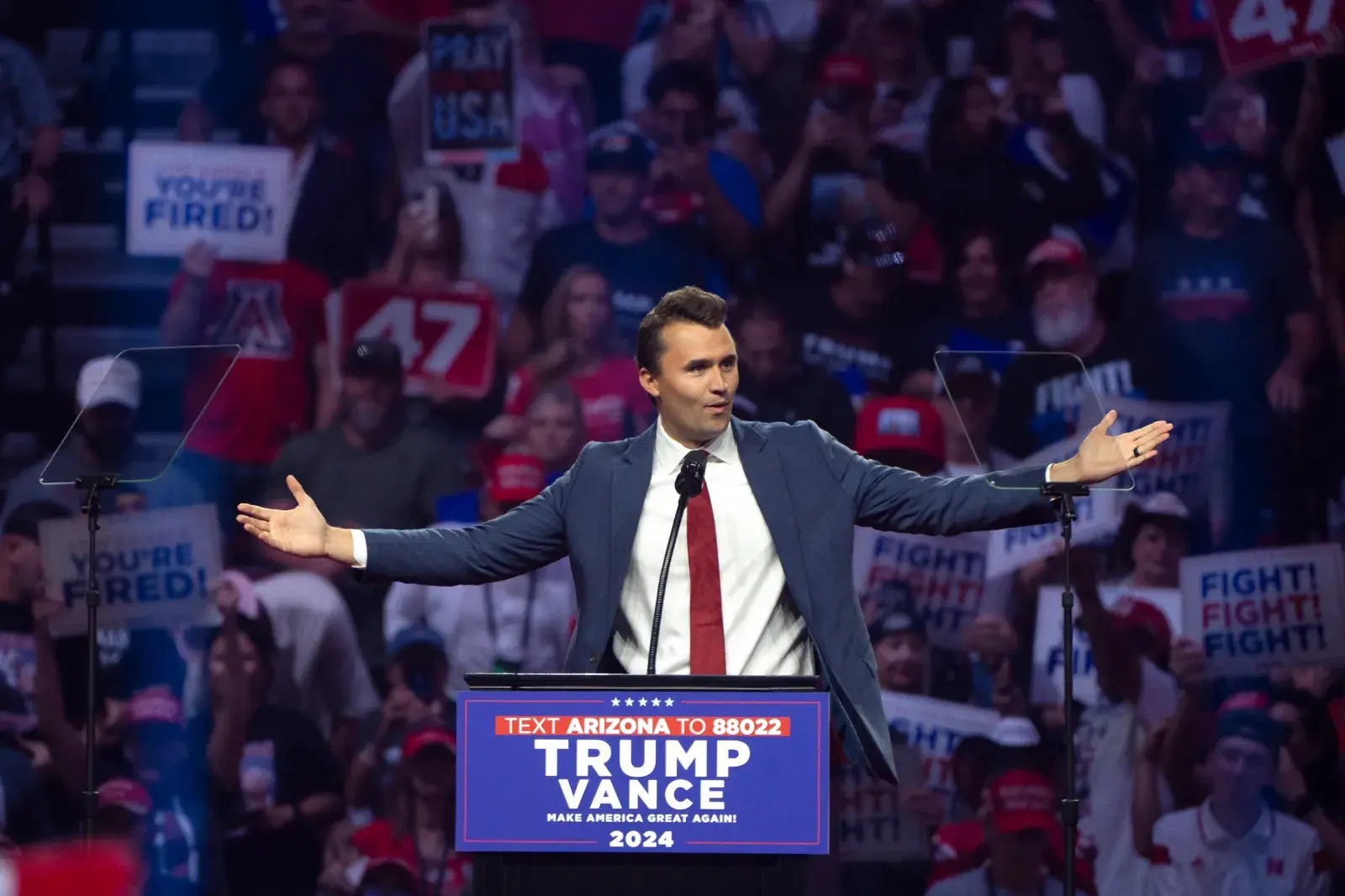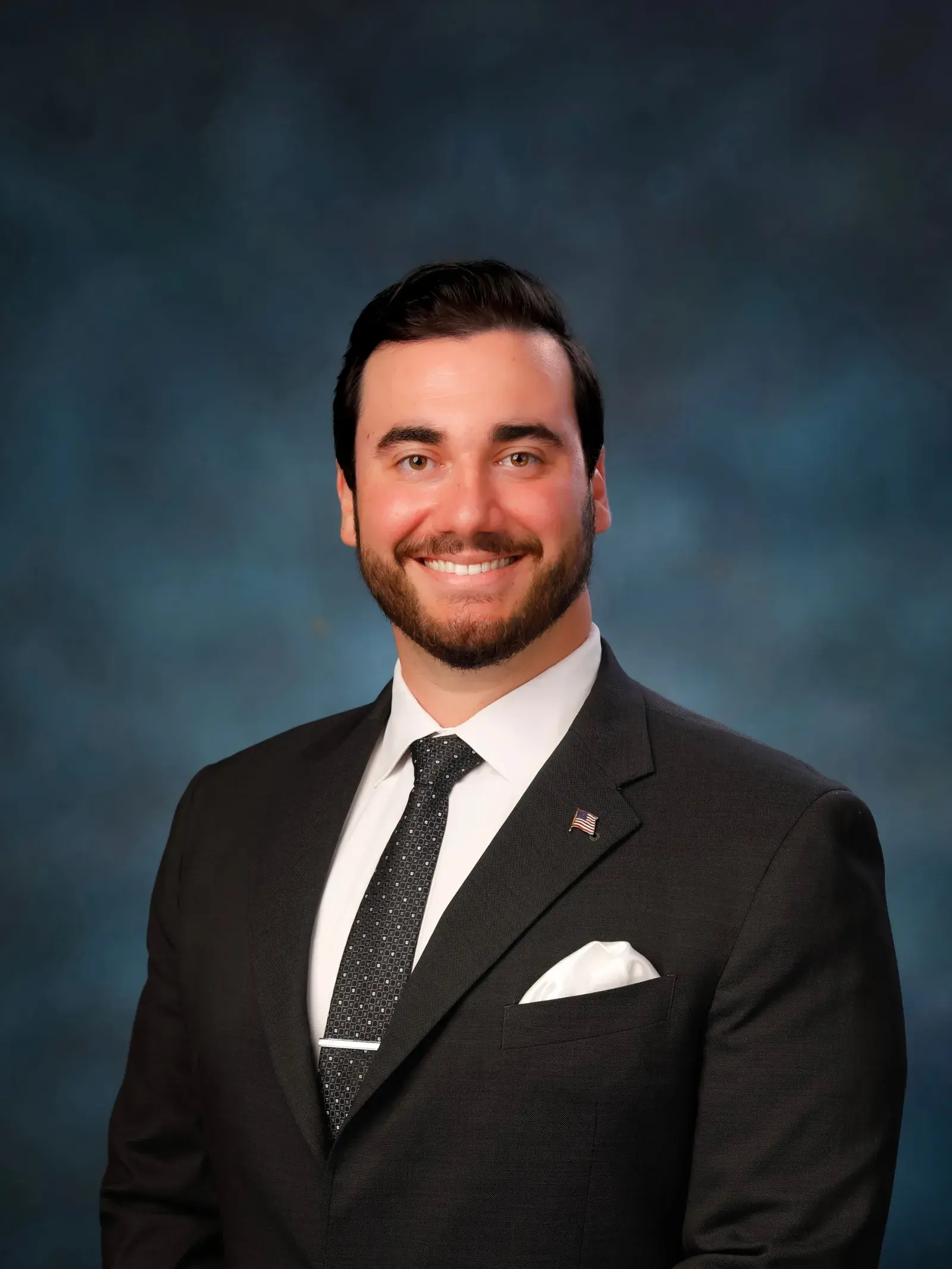Last year, the Republican Party relied heavily on Turning Point USA founder Charlie Kirk’s organizing prowess and influence among young voters to cement a second term for President Donald Trump, making significant gains in the 18–29-year-old vote, according to Pew Research analysis.
Narrowing that gap and making other gains on President Joe Biden’s 2020 margins, Trump swept back into the White House. Kirk’s movement and role in narrowing the young voter gap from 30 points in 2016 to just 19 in 2024 has sparked debate over whether the GOP has cemented more broad appeal among young voters, a bloc that has typically been heavily Democratic.
Kirk’s assassination could prove a threat to that trajectory.
While Turning Point maintains a sprawling and active network across America’s college campuses, young conservatives who spoke to Newsweek say the organization operated heavily from the top down and benefited largely from Kirk’s skill and star power. Turning Point’s effectiveness in swaying young voters—particularly young men—now faces questions in the absence of its leader.

Some Republicans don't think they should need to rely on Turning Point to see continued gains in the young vote.
Some 120 years before Kirk and conservative businessman Bill Montgomery founded Turning Point in 2012, future Pennsylvania Congressman James F. Burke spearheaded the founding of the American Republican College League at the University of Michigan, which went on to become the College Republican National Committee (CRNC) that still exists today.
Like the College Democrats of America, which was founded in 1932, College Republicans has long been an entry point for future leaders in U.S. politics. CRNC alumni include President Calvin Coolidge, House Speaker Paul Ryan, and even former Democratic Presidential candidate Hillary Clinton, who described herself as a “Goldwater Girl” before switching parties in law school.
The CRNC could be poised to build on Kirk’s gains among young voters, but the group has suffered fracturing within its ranks in recent years, leading to multiple branches.
There are currently four competing top College Republican factions.
Along with the CRNC, there is College Republicans United (CRU), the National Federation of College Republicans (NFCR) and College Republicans of America (CRA).
Each says they best represent the MAGA coalition, each has issues with the other factions, and each told Newsweek they would like to see a unified College Republicans group.
Leaders of the groups would like to see the Republican National Committee (RNC) step in an provide an endorsement to help with unification. Similar Democratic groups and the Young Republican National Federation have not dealt with the same competition and splintering within their ranks.
Turing Point has proven effective at winning over young minds while traditional Republican coalition groups have been mired in drama. Beyond the infighting among College Republicans, the Young Republicans recently faced its own scandal. Politico reported that its New York faction has been disbanded over several members’ involvement in a Telegram group chat in which racist and antisemitic messages were shared, including by Peter Giunta, who recently lost his bid to chair the organization. Speaking to Politico at the time, he apologized for the “inexcusable language” in the chat and took “complete responsibility” but was concerned the messages may have been doctored.
With infighting and controversy tearing coalition groups apart, the four College Republicans leaders could face a question whether losing the battle for supremacy is worth preserving the mission at hand.

The Rise of MAGA and Decline of the CRNC
The CRNC used to operate under the direct control of the Republican National Committee (RNC), but after passage of the 2002 Bipartisan Campaign Reform Act, that changed.
The law prevented the DNC and RNC from allocating soft money to allied groups like College Democrats and College Republicans, which resulted in those groups spinning off as 527 organizations that can accept unlimited contributions.
The CRNC hit a peak fundraising quarter in 2004 amid President George W. Bush’s reelection campaign, when it raised $2.72 million, according to a ProPublica analysis of IRS data. Similar activity continued between then and 2016, typically spiking during election years. But, the organization’s fundraising has not broken the $1 million mark since the second quarter of 2017.
Mirroring the RNC, the CRNC faced its own internal friction over the direction of the party amid Trump’s ascent, as various top chapters—like the College Republicans at Harvard—refused to endorse the eventual president.
Alexandra Smith, the CRNC chairwoman at the time, denounced Trump after the release of the infamous Access Hollywood tape shortly before Election Day 2016. As tensions between MAGA Republicans and the establishment flared during Trump’s first year in office, 2018 saw conservatives at Arizona State University break away from the CRNC to form College Republicans United, taking the name to “to designate the MAGA members infighting against the RINO [Republican in Name Only] establishment within the CRNC,” CRU’s website writes.
The group eventually expanded to the University of Arizona, the University of Iowa and Iowa State University. It even at one point included the California College Republicans, but then its growth hit a wall.
The organization invited far-right provocateur Nick Fuentes, a self-described “proud incel” and Holocaust skeptic, to speak at its 2023 national convention, drawing condemnation from the Maricopa County Republican Committee. Its ASU chapter leaders have publicly apologized over racist and antisemitic messages shared between group leaders in Facebook chats. And in January, hundreds at ASU protested the group for encouraging students to report their peers to ICE.
Leaders from the other three College Republican organizations now describe College Republicans United as “dead,” noting its limited geographic footprint and failure to outline its constitution and leadership on its website.

Kevin Decuyper, the 30-year-old chairman of the organization and one of its co-founders, told Newsweek the group’s ability to draw national attention and inspire counter protests to its activities proves the organization is very much alive. He said he is open to posting national leadership and the group’s constitution online. Additionally, he said that while his group may be smaller, it’s the only true “America First” organization and the only one not beholden to establishment interests.
“We're the only youth organization with the principles to schedule a wide diversity of these controversial speakers,” Decuyper said. “The issue is, although we are College Republicans United, these centrist figures don't want to be in the same room as their competition and different factions of Republican thought, so we've been put in a box, relegated to having the more controversial figures because they're happy to have a platform.”
The group’s openness to far-right figures was a key difference from the other three College Republican groups.
When it comes to ideology, the others generally resemble each other in their mainstream and pro-Trump positions.
The fracturing of the National Federation of College Republicans and the College Republicans of America from the CRNC seems to originate in personality conflicts and governance disputes that have included allegations of financial crimes and sexual misconduct.
Allegations of a Stolen Election
Tensions between the two groups go back to the heated 2021 election for the College Republican National Committee chair.
The race was between Western Regional Vice Chair Judah Waxelbaum and South Regional Vice Chair Courtney Britt, who outgoing chairman Chandler Thornton had reportedly wanted to succeed him.
Prior to the bid, in 2019, Britt served as chair of the Virginia Federation and was up against Arkansas Federation Chair Clay Smith for the South regional vice chair role. The British magazine The Spectator reported allegations from CRNC insiders that Thornton “threw his support” behind Britt, with two former female members claiming he participated in a failed plot to have them accuse Smith of sexual assault to help tip the race in Britt’s favor. The women declined, but Britt won the race anyway, stating she was unaware of any such plot.
Two years later, in the 2021 bid for chairman, controversy once again surrounded Britt’s campaign as Thornton faced new allegations of meddling in the election in a report from the conservative outlet the National Review that detailed another effort by Thornton to effectively toss out pro-Waxelbaum votes.
In response, several states announced their intent to disaffiliate from the organization, including the New York Federation of College Republicans (NYFCR).

The NYFCR also came out with a seven-page dossier accusing Thornton of failing to account for $2 million in organizational funds. The dossier alleges that between 2018 and 2021, the CRNC allocated over $1 million to digital advertising but could only verify $164 in spending.
The group voted to secede from the organization, and state federations in Mississippi, Texas, Florida and Oregon followed suit. Additionally, California’s oldest College Republicans group—the California College Republicans—had already been removed from the CRNC after Thornton elected to back a splinter group, creating tension in the nation’s most populous state.
Today, the CRNC is chaired by JT Marshburn, 19, of Georgia who took on the role last summer. Marshburn told Newsweek he sees the CRNC as the primary College Republican group and refrained from commenting on the other organizations' leadership in favor of stressing the need for unity.
“Part of their disputes between each other is because they both are splinter groups,” Marshburn said. “We were the first group. Our mission is bigger than these organizational disputes, and I wish that they would realize that as well.”
New Orgs, Same Tensions

Amid the exodus of state federations from the CRNC, 30-year-old Rachel Howard, who served as Louisiana State chair, emerged as one of the key leaders who blasted Thornton.
She told Newsweek she viewed the aftermath of what happened in 2021 as the “collapse” of the CRNC and believed a new group needed to be formed to engage college-aged conservatives. Joining forces with Christopher Mayer of Alabama, Howard helped to galvanize the factions to form the NFCR in 2022. For a time, this group served as the primary challenger to the CRNC.
But then a fourth group joined the mix.
As the former chair of the California College Republicans, Will Donahue, 26, was familiar with the frustrations that faced his state federation. Originally, he was interested in joining forces with Howard to partner on a new organization, but the pair had a falling out.
Donahue said he then felt ready to retire from politics to focus on law school. However, he took a medical leave of absence from Notre Dame Law in 2023, and with his newfound free time, started asking about the state of College Republicans.
Donahue says he heard “discontent with the way that NFCR was running,” which motivated him to reconnect with his California peers and join forces with then Wisconsin College Republicans Chair William Blathras to form a new group—College Republicans of America.

Neither Donahue nor Howard consider the current CRNC as a real challenger and have criticized it for not being transparent about its chapter count and not posting its constitution or bylaws on its website. Marshburn has said he'd be open to posting the group's constitution on the CRNC website.
Despite their qualms with the organization, Donahue and Howard both said they would not mind joining forces with the CRNC, as it remains the wealthiest of the groups, according to fundraising data, having taken in over $447,000 in funding in 2024.
The two characterized the divisions within College Republicans as a battle between their two organizations for supremacy, with each accusing the other of falsifying the number of chapters affiliated with their organization.
Newsweek could not independently verify the number of chapters affiliated with each group.
Ideological and Philosophical Differences
Beyond facing a heated competition to oversee the dominant organization, Donahue and Howard’s rivalry comes down to competing ideological and philosophical differences on how College Republicans should be run. Each described these differences as manifesting during their first call with each other, yet the two offered different reasons for not partnering with the other.
Donahue has shaped CRA’s governance structure in a “Turning Point-style, top-down approach” to combat the lack of institutional memory and ego-fueled jockeying for leadership roles that, he said, plagued the CRNC. Currently, Donahue serves as the group’s chairman and said he sees himself as a Kirk-like figure, ensuring continuity within the group and guiding the priorities of his chosen president.
“We have watched Republican organizations for decades rise and fall because of democracy,” Donahue told Newsweek. “Bureaucracy kills volunteer organizations. It just does. People care about their titles, they care about their resumes, and that just totally takes over the conversation. You don't actually get things done.” He said Howard’s commitment to an elected executive board was the reason the two did not partner earlier. Howard told a different story.
She said Donahue insisted on admitting College Republicans United into their new organization, something she rejected due to their past behavior. Donahue has denied this and has denounced CRU.
He said that the “rumor” was given life because California College Republicans had been removed from the CRNC and found itself competing with the California Federation of College Republicans splinter organization.
The California GOP told California College Republicans—in 2022, before Donahue was chair—that it needed to affiliate with a national organization or the state party would recognize the Federation, he said.
He said that the group was forced to affiliate with CRU but ultimately disaffiliated later. The two California groups have since merged.
Decuyper did not dispute Donahue’s characterization of the relationships but said the arrangement with the California Republicans was very much a “dual partnership.”
In turn, Donahue said Howard has called his group “too Trumpy.”
Donahue also said Howard campaigned for 2024 GOP presidential primary candidate Nikki Haley, showing Newsweek a picture of Howard at an event where she was wearing a lanyard that matched those of individuals wearing Haley campaign gear in the background. Howard denied stumping for Haley and said visited NFCR members who’d campaigned for Haley, DeSantis and Trump. She labeled this as a “smear campaign” by Donahue and showed a picture of herself at a 2019 Trump rally holding a sign showing her support for the president.
Donahue said members have defected from the NFCR to join his organization due to discontent over Howard’s handling of NFCR’s finances and FEC filings. Some of those individuals were issued cease and desist letters from the NFCR demanding they stop speaking about NFCR finances, Howard and Donahue said, with Howard stating that the FEC told her the NFCR did not need to submit filings due to the nature of its campaign work.
Howard has also accused Donahue of financial mismanagement, citing IRS filings that she says showed his organization was in over $100,000 of debt as of its fourth quarter 2024 filing. He said those numbers were the result of needing to carry investments from the organization’s direct mail firm, ATA, on their balance sheet, but because this agreement was made through a no risk contract, this is not an amount that needs to be paid back.
“I do think right now some of the factions are so different from each other that if you put them in a room together, I think that would potentially cause more issues,” Howard said. “In a perfect world, of course I would [like to see College Republicans unified], but at the end of the day, we don't live in a perfect world, so I'm not sure what the future holds.”
Unifying the College Republicans
Despite their differences, both Donahue and Howard said they want to see College Republicans unify. They acknowledge that they share the same goals of advancing conservative values and helping GOP candidates win elections.
College Republicans provides a vital forum for that, they argue, because it serves as a key entry point for America’s youth into Republican politics while creating a sense of community around political involvement.
Each of the organizations offer opportunities to engage in campaigning and sometimes sets up members with professional opportunities. They carry out leadership training, conduct door knocking, engage in fundraising and fill entry-level political positions.
Leaders for the groups suggested their groups are better equipped than activist organizations to prepare young conservatives for political and policy careers because they are more focused on professional development and preparing individuals to navigate the party structure. They argue they can campaign more effectively than organizations like Turning Point USA and its sister organization Turning Point Action, which respectively as 501(c)(3) and 501(c)(4) organizations are limited in the direct political activity they can carry out.
However, with the personal nature of some of the disputes and the distrust that has been bred between different state federations and the national organizations, the four College Republican leaders believe the RNC could play an effective role as referee, by potentially mediating a merger and endorsing a unified organization.
A former RNC official who worked closely on these issues told Newsweek, “With every chair that comes through the door, the call is being made by either the chair themselves or one of their senior advisers to not recognize any coalition organizations as an official RNC auxiliary.”
Newsweek contacted the RNC about the desire among College Republicans to unify the group and receive an endorsement and received the following statement from RNC National press secretary Kiersten Pels: “President Trump’s 2024 campaign did tremendous work last year expanding Republican outreach to young voters across the country and energizing a new generation of conservatives. The RNC is committed to continuing that momentum and building a strong, unified movement to win in 2026.”
Republicans are facing a critical moment when it comes to engaging America's youth. Closing Trump’s youth margin by roughly 11 points stands as a victory that indicates momentum among the bloc on the right, but polls have since shown the president’s support among the demographic starting to soften.
Trump won’t be president forever, and it could be tough for a candidate in the near future to match his charisma and pop culture relevance. Turning Point USA, under the leadership of Charlie’s widow Erika Kirk could continue as being the most effective in furthering conservative gains among America’s young voters.
If Turning Point becomes engrained on college campuses, the fractured College Republicans could face becoming irrelevant. But, if Turning Point fails to retain its 2024 prowess, Republican leaders could be left trying to consolidate the pieces of what was the more than 125-year-old organization called College Republicans.




















